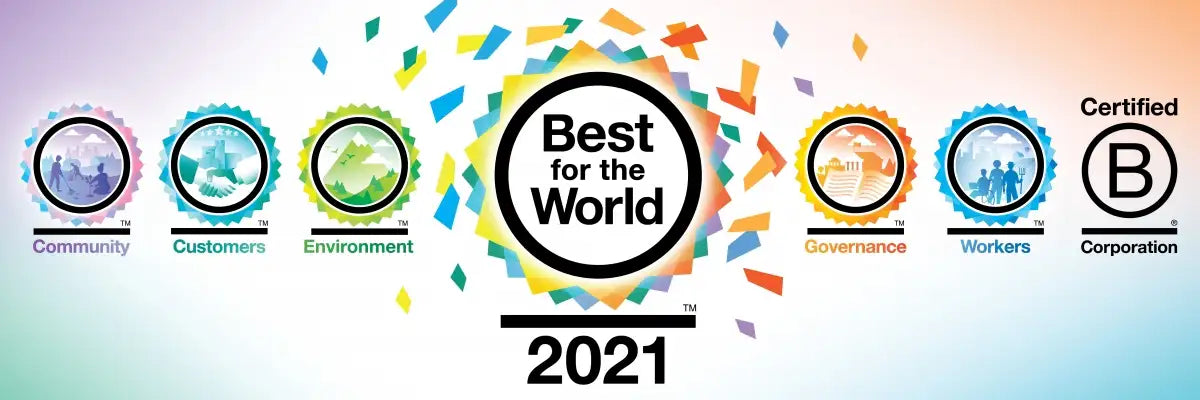The big B: What does B Corporation stand for?
As early as 2006, the B Corporation – B Corp for short – started the movement in the USA under the motto Using business as a force for good . This was implemented in the international B Corp certificate. This is awarded to sustainable companies by the non-profit organization B Lab. The idea behind it is that it doesn't have to be either capitalist pursuit of profit or the common good , but that you can also combine both. The B in B Corp stands for Benefit , ie positive work . B Corporation itself writes on its website : "B Corporations are companies that want to achieve greater sustainability and are committed to regularly measuring and continuously improving their social and environmental impact."
With the B Corp certificate, B Lab wants to build a global network of companies that meet strict social and environmental standards, assume social responsibility and are characterized by transparent processes. So far, it seems, they have been successfully implementing their mission: as of September 2022, over 5,600 companies from 85 countries had received the prestigious seal.
But be careful, there is a risk of confusion: In the USA there are also so-called benefit corporations, which make up their own form of company. Such companies are committed to dealing well with the environment, employees and society. But that has nothing to do with the seal that we are looking at in this article!
To B or not to B: How can a company get certified as a B Corp?
Back to B Corp and the corporate certification process:
A fundamentally important criterion that is assumed by B Corp is the pursuit of the stakeholder approach. This means that the demands of all interest groups should be taken into account in the decision-making process, i.e. not only the shareholders (according to the shareholder approach), but also employees, customers, suppliers, local people and much more.
The certification process is basically divided into two phases :
When a company aspires to become a B Corporation, they must first fill out a questionnaire. This contains questions about corporate management, employees, community, environment and customers. The questions differ depending on the size and type of company, but a maximum of 200 points can always be achieved. Companies that achieve at least 80 points advance to the second round.
In this, the information from the questionnaire is personally checked by B Lab. It may be necessary to prove this by submitting additional documents. If the company meets the B Corp requirements, it receives the certificate. In order to meet the requirements of the greatest possible transparency, B Corp publishes the results of the certification process on its website .
But: Like most certificates, B Corp. The questionnaire can still be filled out free of charge. After that, however, a submission fee of 250 euros must be paid. If the company receives the B Corporation designation, it then has to pay an annual amount of between 500 and 50,000 euros for the certificate, depending on its size, location and annual turnover.
And: The certificate is not valid forever. The companies have to renew the certification process after 3 years if they want to keep the seal.
Is there also criticism of B Corp?
So far so good, one might think, right? But, as is often the case with almost all certificates, the flagship label for sustainable corporate culture is not immune to criticism.
What exactly does B Corp mean by sustainability ?
The first point is also the most obvious: What exactly does B Corp stand for? For sustainability, yes, but that doesn't say much, does it? B Corp generally takes a very holistic approach. This can be interpreted as a strength, but also as a weakness. At least from the outside, this objective quickly appears a bit blurred and daring. For example, with regard to the ecological dimension of sustainability, the impact of the company's actions on the environment, the certification system tends to keep a low profile.
Misuse of the seal for greenwashing
The objective of the seal is therefore not precisely defined and its meaning is difficult to pin down in concrete terms. What tops it all off is that some of the B Corp companies are probably the opposite of what people understand as sustainable. For example, Innocent Drink received the B Corporation seal in 2018. However, the beverage manufacturer belongs to one of the definitely biggest environmental sinners, to Coca Cola, and sells a large part of its drinks in disposable bottles. Just like Evian, which also makes a major contribution to plastic pollution worldwide with its lack of a deposit system. And: Since June 2022, Nespresso has had a B Corp. Nespresso, the capsule coffee from Nestlé. We ask ourselves: What does this have to do with ecological sustainability? So the accusation of greenwashing is not too far-fetched.
Small business disadvantage and lack of incentives to improve
The point of greenwashing is somewhat invalidated if you look at the number of applications received and then B Corps actually awarded. Because only 1 out of 3 applications leads to the receipt of a certificate.
But: accusations have been made again and again that the certification process is more difficult, especially for small companies than for large ones. It is said that the application process for a B Corp is a bureaucratic gauntlet and an immense challenge for smaller companies with fewer staff capacities. In addition, the support from B Lab is rather moderate, especially for smaller companies.
Another criticism that goes in a similar direction is that receiving a B Corporation seal reduces the incentive for companies to keep improving. Of course, the certificate has to be renewed every few years. However, renewed does not necessarily mean that the company is improving, but at least maintaining the standards. For smaller companies, on the other hand, the legal obligations towards B Corporation can even have a restrictive effect and slow down basic growth.
Structural weaknesses of the B Corp system
Another weakness of the B Corporation, just like Fairtrade and many other globally active seals, is the guarantee of independent control. How is compliance with the criteria checked independently and the effects of the measures evaluated?
Another shortcoming of the system is that B Corp cannot be held liable for any shortcomings. Despite the sometimes enormous sums that companies cede to the label every year, B Corporation is not liable for companies that do not meet the required standards. Changes to the company's articles of association can also be made without these being communicated transparently.
Our conclusion: B Corp does a lot of things right, but not everything
For our final conclusion, let us recall the meaning of seals: Seals are intended to make the purchase decision easier. According to surveys, sustainability as a topic is becoming more and more important in the decision for or against the product, especially among young people. So a certain standard that B Corp guarantees definitely makes sense for many. And: The more entrepreneurs get certified, the greater the pressure on other companies to follow suit. So becoming a B Corp could eventually become the norm and would improve the working and living conditions of many people.Nevertheless, B Corp, just like Fairtrade and many other globally active seal systems, is not immune to criticism. It does a lot of things right, but not everything. If you want to be 100 percent sure, it is essential, as always, to do your own research on the company.
A few chocolate companies are also B Corp certified, such as one of our favorite Ugandan manufacturers, Latitude. But we would put our hand in the fire for this one, just like for all other manufacturers whose chocolate we offer in our shop . Because our shop only contains chocolate that we have selected according to clearly defined sustainability criteria: Fair payment (far above Fairtrade standards), sustainable forms of cultivation (mostly far above organic standards and usually in a permaculture environment without deforestation of rainforests ) and the production in the country of origin of the cocoa.



